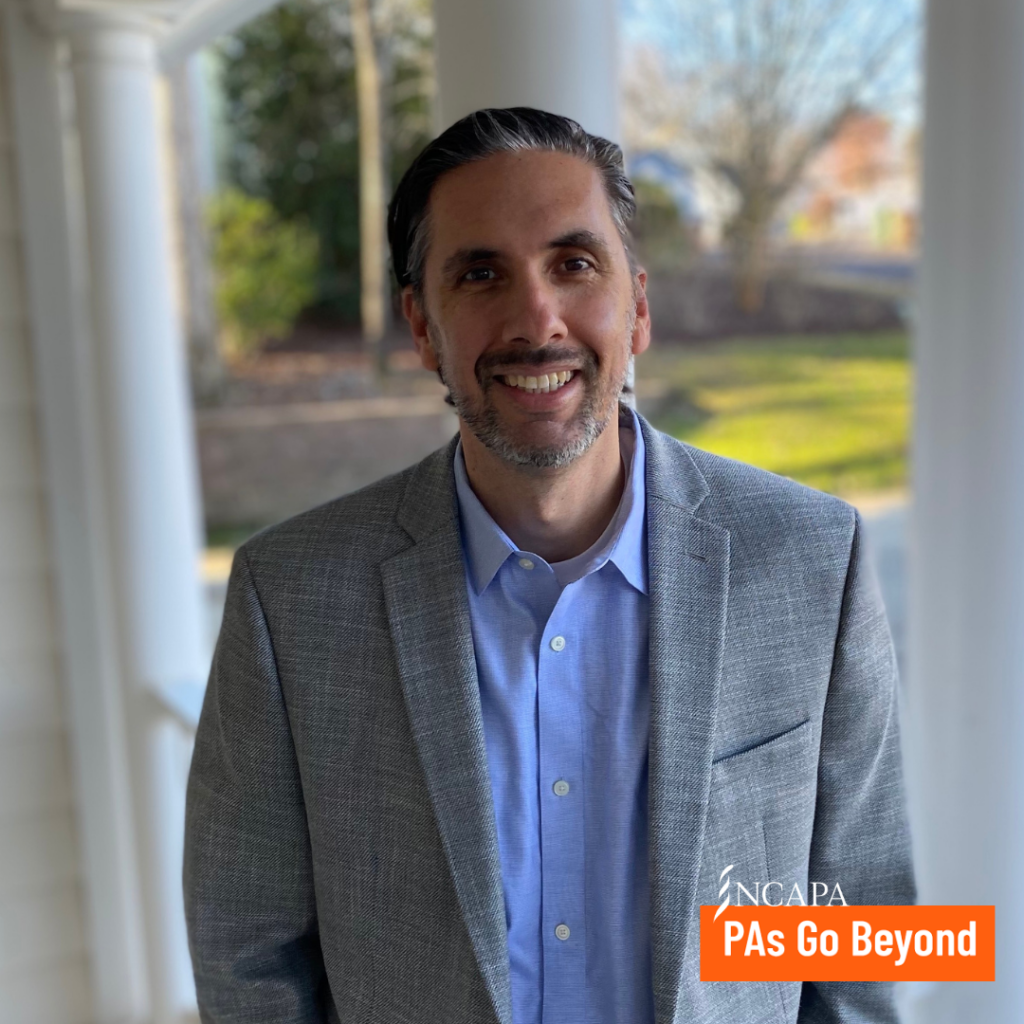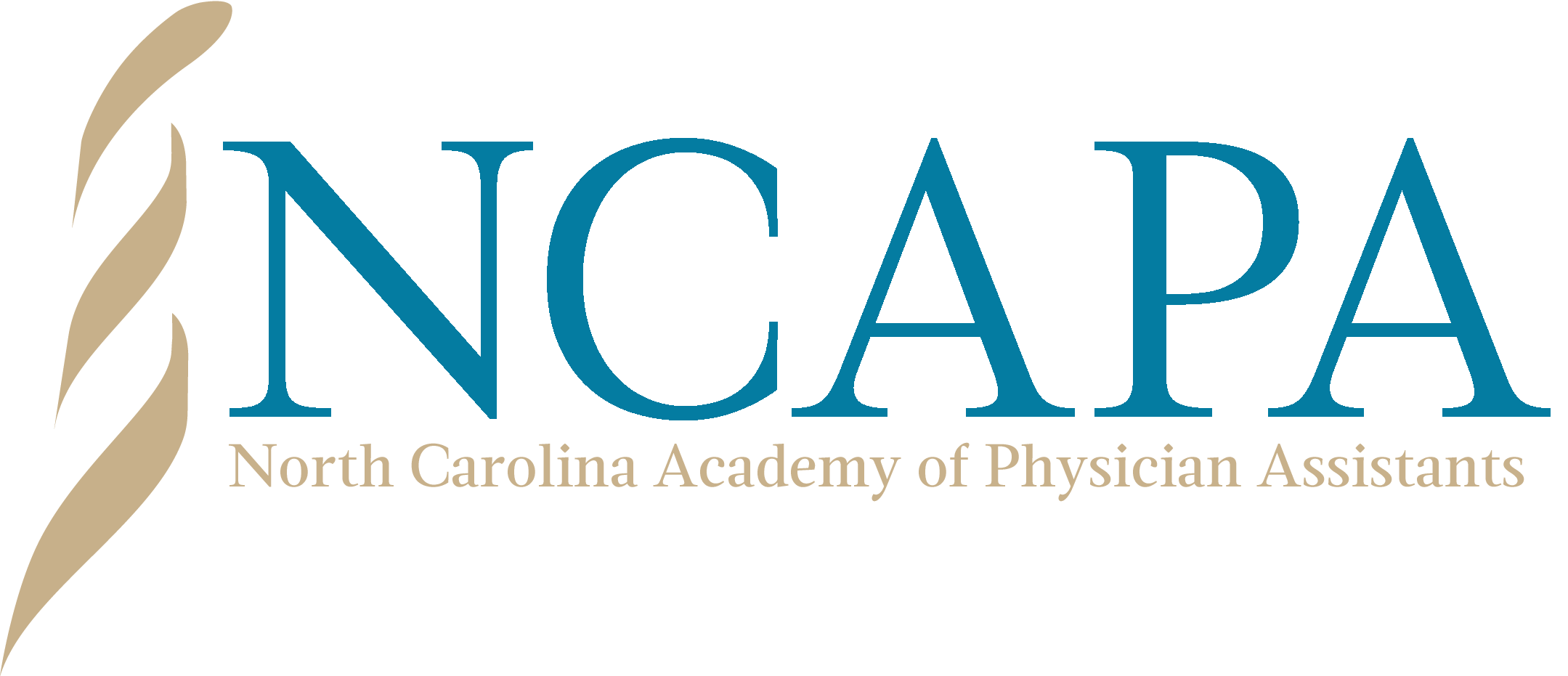As part of the 2023 PA Week Celebration from Oct. 6 through Oct. 12, the NCAPA is highlighting NCAPA Members and North Carolina PAs Going Beyond at *every stage* of their PA career, from being a Pre-PA, to PA student, to Early Career PA, to having been a practicing PA for over 20 years – and everything in between.

Our practicing PA member highlight for today is Shaun Lynch Ph.D., M.S., MMSc, PA-C, who is an Associate Professor and Director of Curriculum in the online Doctor of Medical Science program for PAs at High Point University. He graduated from the Emory University PA program in Atlanta, Georgia. In addition, PA Lynch has been a practicing PA for over 12 years, and also practices one day a week in an urgent care within the specialty of occupational medicine. He says, “My personal mission has always been to impact healthcare delivery by educating competent and compassionate Physician Assistants to lead through communicating effectively and thinking critically.”
When asked to describe his favorite part or his daily routine in his current roles, he told the NCAPA, “One of the things I enjoy about working as an educator is the daily variety in my work. This can consist of teaching responsibilities pertaining to instruction and assessment, participating in meetings related to service within my program, department, university or profession, and engagement in research and scholarly activity to advance PA practice. Furthermore, given my leadership position with our program, I am also involved in developing effective assessment strategies for course, curricular and programmatic improvement to ensure student learning outcomes are met with best educational practices in teaching and mentoring.”
“Within my clinical work, each day of practice brings an assortment of different patients, pathology and procedures,” Shaun continued, “This includes evaluating and managing occupational-related injuries and illnesses, conducting medical surveillance and fit-for-duty exams, performing Department of Transportation physicals, and providing acute care to urgent care patients.”
What made you want to be a PA? Why did you decide to pursue the PA route?
“After working briefly in corporate wellness upon finishing my degree in Exercise Physiology, I felt the desire to return to school. I was limited in my abilities to grow professionally and needed to build a skill set to advance within the field. I was fortunate to be given the opportunity to pursue a master’s degree in Exercise Science from Appalachian State University.
It was during this time in the mountains of Boone when I finally started to thrive in the university setting. I learned how to manage time in my studies, review and appraise research, communicate effectively, and foster aspirations for wanting bigger things in my life. And just when things were going well, a phone call from home would change everything. My father became suddenly ill in my last semester of school. This was an inconvenient time as I was taking 17 credit hours, working 10 hours per week as a graduate assistant, finishing my thesis research and driving six hours home on the weekends to help care for my father. He suffered from terrible dementia and would ultimately pass away weeks before my graduation.
Spending a considerable amount of time in health care facilities and nursing homes assisting in the care for my father stimulated a curiosity for medicine and a strong desire to serve and advocate for patients. These experiences coupled with my academic achievements and work experience in grad school affirmed that I needed to dream bigger and pursue a career in healthcare as a PA.”
What is your favorite thing about being a PA?
“Working as a PA allows for continued personal growth and contribution in the service of helping people. In my opinion, these are two of the main ingredients that allow us to live more meaningful and fulfilled lives. As a first-generation college student, I realize the great privilege given to me in taking care of patients. Furthermore, I have been grateful for the opportunity to use my knowledge and experience as a PA to teach and give back to our profession by educating and mentoring the next generation of healthcare providers.”
What made you want to become a member of the NCAPA? Why do you think NCAPA membership is valuable?
“As PA educators, we strive to encourage our students to get involved within our professional constituent organizations. Additionally, as leaders we should also model this involvement and I’ve had the privilege of volunteering on the Professional Development Review Panel with NCAPA. Over the years I have found NCAPA to provide appreciated value in continuing professional education programming, advocacy to advance and modernize the PA profession, and timely resources and support from their leadership, board, staff and volunteers within the organization.”
How do you want the PA profession to change in the next 5 or 10 years?
“My hope is PAs and the PA profession continues to advocate for the quality of care and value we contribute to the healthcare team and system. Furthermore, the profession should continue to produce more research and data supporting how PAs can improve patient outcomes. Lastly, I do believe the profession needs and will eventually move to an entry-level doctorate degree reflective of the quality of our educational model and comparable with other health professions.”
What are some of your passions/interests aside from being a PA?
“I have a passion for personal development and self-improvement. I enjoy writing content and speaking on topics aimed at empowering people to live with greater impact in their lives. This includes discussing the intersection of improved financial literacy and wellness, as well as strategies to build meaningful relationships by living a life of service in contributing to others.”
“However, my greatest happiness is spending time long distance running, travelling, cooking and being present with my family as a husband and father to our three kids.”
If you weren’t a PA, what would you be doing instead?
“I would have gone to culinary school and became a chef! Food has a powerful way of bringing people together to learn about each other by sharing stories, exchanging ideas, celebrating moments, and having conversations with people from different cultures and backgrounds who may not look, think, or hold similar beliefs about the world as you.”

